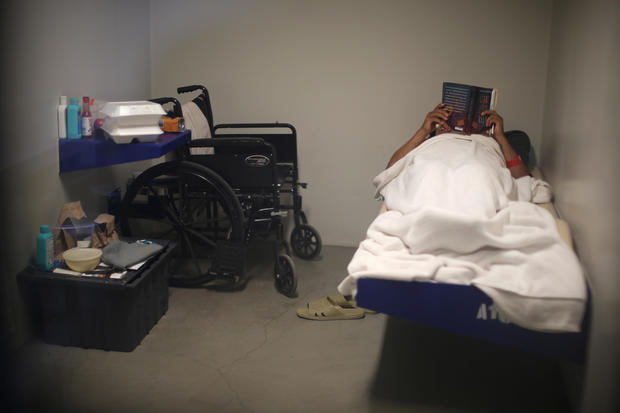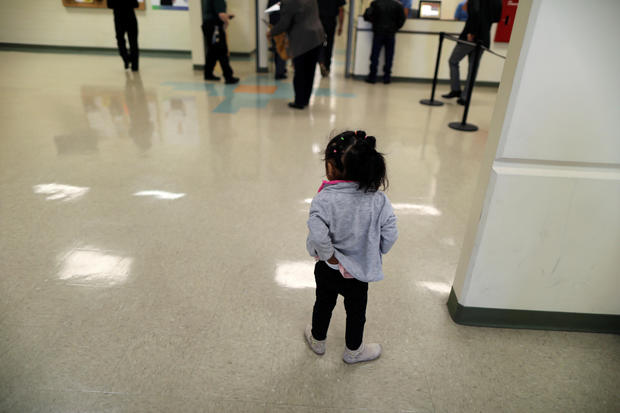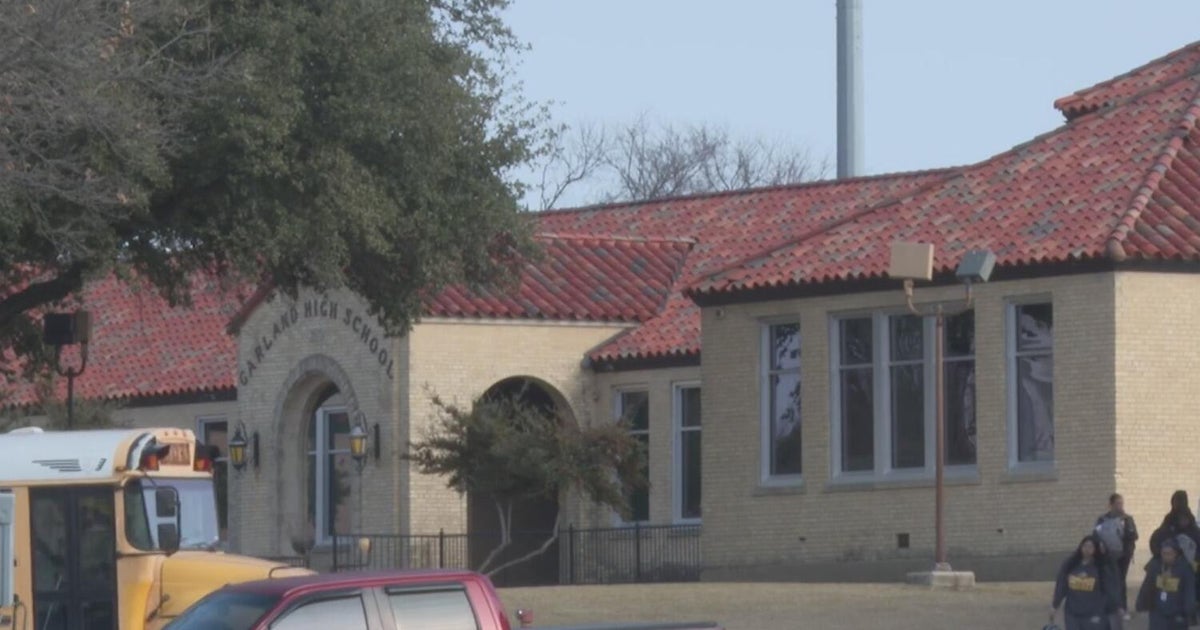Private prisons were supposed to thrive under Trump — then came a backlash
- At least eight banks have said they won't write new loans for private prison companies as investor sentiment sours.
- Geo Group and CoreCivic, the two biggest publicly traded private prison companies, are pushing back against the criticism.
- Pressure from activists is weighing on the shares of Geo Group and CoreCivic, which have shed half their market values since their post-election peaks in April 2017.
Business was looking good for private prison companies soon after President Donald Trump took office in 2017. Within weeks of his inauguration, then-Attorney General Jeff Sessions signed an order reversing an Obama-era directive to phase out private prison use.
That caused shares of the two largest private prison companies — CoreCivic and GEO Group — to soar, with each reaching a post-election peak in April 2017. Since then, however, both companies have lost roughly half their stock market value amid mounting public and investor concerns, while at least eight banks have moved to distance themselves from the private prison business. Here's a look at what's behind that shift in the companies' fortunes.
Rising population means more ICE contracts
A year ago, executives from both companies touted a rising need from Immigration and Customs Enforcement (ICE) to house a growing number of detainees.
"We've seen a steady increase in our ICE populations throughout the country, and we expect this trend to continue as ICE seeks additional capacity," said David Donahue, senior vice president of GEO's Corrections and Detention division, on an August 2018 call with Wall Street analysts.
That same month, CoreCivic CEO Damon Damon Hininger told investors that more ICE contracts would "contribute meaningfully to earnings growth to 2019."
Their comments came as reports gained widespread attention about the mistreatment of migrants seeking entry to the U.S. at the Mexican border and children separated from their parents, as well as squalid conditions. That prompted outrage from many quarters, including lawmakers and American citizens, and raised questions among some investors about the ethics of investing in private prisons.
Both Geo Group and CoreCivic said they've been wrongly caught up in the backlash surrounding child separation and other controversies at the Mexican border. The companies have repeatedly said they don't manage centers that house unaccompanied immigrant minors or operate border patrol facilities.
Investors rethinking industry
But for some investors, that distinction matters less and less. So far this year, at least eight banks have either said they will no longer lend to private company prison operators or are limiting their engagement with the industry. As a result, some investors are thinking twice about where to put their money.
CalPERS, California's $356 billion pension fund, may need to reconsider an earlier decision to keep its money in the public prison companies, California Comptroller and CalPERS ex-officio board member Betty Yee told CIO Magazine last week. Investment in the private prison industry is getting riskier as banks withdraw, Yee told the magazine.
"As more information comes to light regarding the egregious conditions at U.S. border facilities, it elevates the larger issue of private prisons housing migrants," Yee said in an e-mailed comment through her office to CBS MoneyWatch.
Activist pressure spurs action
Public pressure is spurring action, too. More than 100 organizations known as the Families Belong Together Corporate Accountability Committee have lobbied banks, companies and public officials to divest, Kristin Rowe-Finkbeiner, the executive director of MomsRising.org, told CBS MoneyWatch in an interview. MomsRising.org, which focuses on creating family-friendly policies, has more than 1 million members.
"It's a unique moment where a wave of organizations are hearing from their members and that greater pressure is having an impact," Rowe-Finkbeiner said. "So for our members, we're hearing that it's a priority to take the profit out of causing pain."
Of the 14 banks identified by activists as extending credit or providing loans to Geo Group or CoreCivic, six have said they'll cease lending to the industry.
Those six banks — Wells Fargo, JP Morgan, Bank of America, SunTrust, FifthThird and BNP Paribas — together represent $1.93 billion, or 72%, of the financing that is estimated to be available to CoreCivic and Geo Group, based on U.S. Securities and Exchange Commission filings. Most loans and credit lines under agreement stretch to at least 2023.
Other banks
Two additional banks told CBS MoneyWatch they have no plans to lend to the private prison industry in the future: Barclays and U.S. Bank. Both said their loans to the industry aren't material to overall finances, according to spokeswomen for the banks.
PNC said its exposure "is extremely small." PNC is "committed to making thoughtful decisions that take into account the interests of all of our stakeholders," a spokeswoman said.
Regions Bank declined to comment, saying policy makers and government officials "are in the best position to address" the issue, a spokeswoman told CBS MoneyWatch in an email.
Citizens maintains "a commitment of lending to companies that conduct their business in a socially responsible manner and if that is not the case we are prepared to exit the relationship," a spokesman said by telephone.
Pinnacle Financial Partners isn't considering ending its loans to the industry, according to a spokesman. The bank generally lends to companies that "have strong leadership teams, sound credit histories and good operating leverage," CEO Terry Turner said in an e-mailed statement.
First Tennessee and Synovus banks both declined to comment.
ICE contracts
Still, some of the ICE contracts that prison company officials hoped to secure have indeed come to fruition. Since Mr. Trump took office, ICE has awarded more than $480 million in federal funds to GEO Group and more than $331 million to CoreCivic, Axios recently reported, citing USA Spending figures.
CoreCivic and Geo Group are for-profit prison companies organized as real estate investment trusts, known as REITS. Under the structure, 90% of the company's taxable income must be distributed to shareholders, and the REIT doesn't pay federal taxes on those gains.
Both receive about half of their annual revenue from federal agencies, according to annual filings with the SEC. They also both count on ICE for providing at least $1 of every $5 in revenue.
CoreCivic expects the banks to honor lending and credit agreements until their expiration in 2023, company spokeswoman Amanda Gilchrist told CBS MoneyWatch in an email. CoreCivic "has meaningful cash flow in excess of dividends paid and the resources to fund day-to-day operations and pay off debt."
Geo Group acknowledged in a recent SEC filing that "increased public resistance to the use of public private partnerships" may hurt its business.
The bank divestment efforts are based on a "false narrative" that is a "deliberate mischaracterization of our role as a long-standing government services provider" that "has been allowed to impact a decade-long banking relationship," Geo Group spokesman Pablo Paez said in an e-mailed statement. Geo Group's facilities provide "humane residential care," he said.
"Get immigration right"
Some 2.3 million people are held in U.S. correctional facilities, including 109 federal and 1,719 state prisons, according to the Prison Policy Initiative, a think tank. As many as 9% of U.S. prisons are run by private entities.
Some senior officials at Bank of America were "very upset about the broader issues of prison reform and sentencing reform" and brought up the issue in meetings, urging the bank to "make a statement," CEO Brian Moynihan recently told Fox News, according to a transcript. The bank ultimately decided to exit the industry.
He added that the country needs "to get immigration right."







